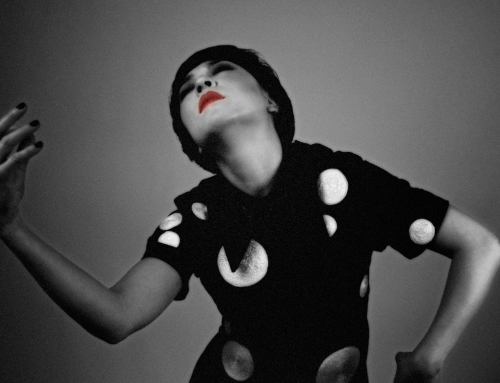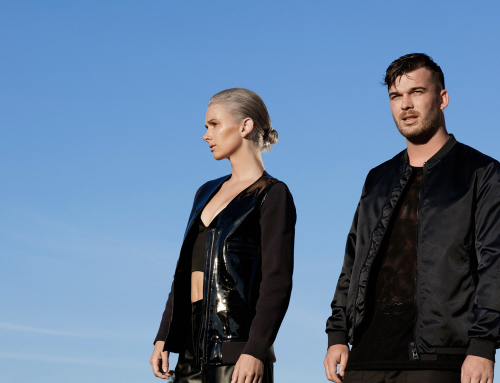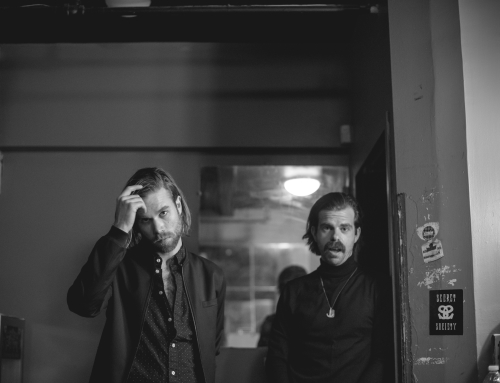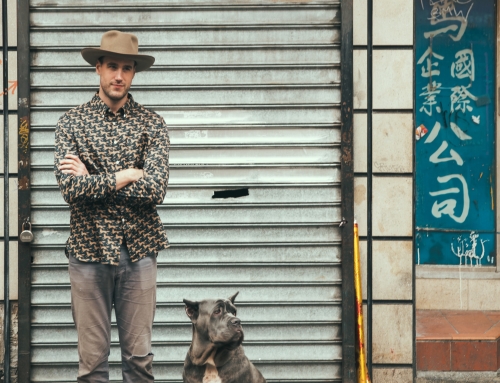Office men by day, producer Trevor Gureckis and singer Drew Smith of My Great Ghost might have more on their hands than a “midnight studio project” if fans have anything to do with it.
Since they released their self-titled EP this past summer, listeners of My Great Ghost have been anxiously anticipating more from the somber electronic pop band. Happily, we can report news of participation on a tribute album to the duo’s rather illustrious office mate, Philip Glass.
Entitled REWORK: Philip Glass remixed, the two-disc set is a celebration of the influential composer’s 75th birthday season, set for release October 23rd. My Great Ghost join artists including Jóhann Jóhannsson, Dan Deacon and Beck, the man at the helm of the project alongside producer Hector Castillo. Plans are in the works for even more Glass-centric projects with Gureckis co-producing an album of the composer’s songs with producer Kurt Munkacsi and singer Tara Hugo, available later this year.
Despite demanding side projects, Smith and Gureckis continue to find the time to devote to their own music. Wrapping up work on a new single, the men behind My Great Ghost take a break to talk to FILLER about balancing their day jobs with the band and carving out their own musical niche.

How did the collaboration between you and Drew Smith come about?
Trevor (T): I work as Philip Glass’ music assistant and Drew works in Philip’s publishing company, so we were always hanging out in the same office. I was working on a zombie short film called Love of the Dead and one of the scenes required a love ballad, which was to play over a guy having sex with his zombie girlfriend whom he had kept alive in his apartment. I knew Drew could find the words for that situation.
I’d like to hear those lyrics! What’s the story behind the name, My Great Ghost?
T: Actually, it was pretty practical. In our painful search for a band name, my brother sent me a list of suggestions, some of which were based on songs. Great Ghost is a song by Phil Elvrum of Mount Eerie, who I’m a fan of. Of course when you think you find a name, you Google the hell out of it to make sure you’re not going to confuse anyone. For a while we thought we had made it with Great Ghost but then I stumbled on a Great Ghost who writes electronic music in Brooklyn. So I thought of just adding the word “My” like My Bloody Valentine, of whom I’m also a fan.
Any deeper meaning that appeared organically?
Drew (D): We write songs for a reason, but I think most of the time we have no clue what that reason is until the song is recorded or maybe not even until its been out there for a while. Then things start to come out that you never noticed, and they’ve been there the whole time staring you in the face. I think its a sort of tribute to that.
In your day job at Found Objects Trevor, the company states its mission to be to create “inventive, effective, striking and stylish music.” Is that something My Great Ghost sets out to do as well?
T: Found Objects is a composer/producer collective, but the business side of the collective is a music production company that writes for ads, film, tv, video games and other media. There are probably 100 other music houses in New York that are trying to do the same thing, so we look for ways to distinguish ourselves and pitch our angle, which we think is pretty unique.
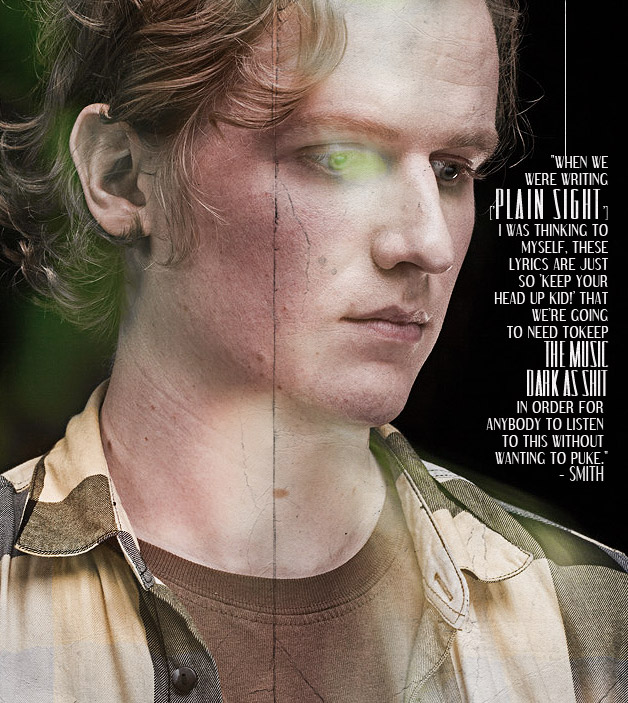
But My Great Ghost is a project that isn’t trying to please anyone but Drew and I. Although, we do hope people share our taste and connect to the music and lyrical content of the songs.
How has it been balancing your work at Found Objects with your latest music project?
T: It’s definitely difficult because the work we do in Found Objects is fast and intensive. You can get an email or call at any minute and have drop everything you’re doing and run into the studio. It feels almost like a life or death panic when you have a growing business to support. But when you’re working, you’re also writing music and learning a ton from doing it. It’s an exercise in both music and audio technique.
Do the worlds ever collide?
I’ve worked on spots where I come up with a hook that I end up pitching to Drew if it’s rejected by the client. There’s one that Drew and I made into a whole song, but an earlier instrumental version of it was picked up later for an IBM spot so I had to abandon it as a My Great Ghost track. Gotta pay the bills.
I imagine your background in classical and composing has helped produce the distinct music of My Great Ghost. Do you think that frame of reference sets your sound apart from more mainstream electro-pop like Lady Gaga, Lana Del Ray, or even Hot Chip?
T: I think of my classical background as one of many experiences I’ve had in music. Things naturally bleed a little bit from one to another, but when I write pop music, I try to write pop music and not some hybrid of the two. This is basically to say that there is some sort of line between them, in my opinion. I don’t see how knowing Ligeti’s music helps me work out a vocoder line in a chorus. They are so completely disparate as to be meaningless to each other. I’m just reacting to the sounds and music that I enjoy — just like everyone else.
At Found Objects part of the job is finding music that works well at “selling” a commercial, with My Great Ghost does appealing to mainstream tastes matter as much to you as creating a sound that is uniquely yours. In other words, how much do you care about being radio-friendly?
T: I think our music is accessible and up front, but we’re not out to sell anything, like we do in Found Objects. I like a lot of mainstream music, and I’m particularly inspired by the production quality. Maybe that comes across.
Your sound is very unique, how did it come together?
T: I constantly think about our sound. Our new EP has a lot of similar instrumentation between the tracks. Most of the drums have these massive tribal beats that I made using basically the same instruments. In the process of making this record, I developed a suite of sounds that I would rely on for almost every song. It was a foundation from which we could drift. I figure it’s the best way to solidify an identity.
Any current bands out there with a sound that you would compare to My Great Ghost?
T: There are a number of bands that I look up to, and I think you can probably hear that. But currently, I’m really into Purity Ring, Grimes, and Crystal Castles, which some people are calling witch-house. Super dark electro-pop would be my description. I don’t think that’s in our EP, but I’ve done a few remixes recently that explore that sound a bit.
What about you Drew?
D: If you look at the synth rock stuff, you could talk about MGMT and M83 as being similar, but I think we’re a bit gloomier then those guys. Which is why we thought the summer was such an ideal time for us to release our debut EP.
The sunniest, gloomiest time of the year. With your genre of music, often lyrics can tend towards the serious side, while melodies keep upbeat, since back to the days of Depeche Mode and New Order. Your track “Plain Sight,” is a little like that. What’s the story behind that track?
T: Drew probably knows best on this. I just worked on side-chaining and learning how to use my Prophet 08, which I had bought right when we started this song.
D: Odd. When we were writing it I was thinking to myself, well these lyrics are just so “keep your head up kid!” that we’re going to need to keep the music dark as shit in order for anybody to listen to this without wanting to puke.
Well I don’t think you have to worry about that!
With that said, it’s not completely surprising you’d feel that way. We were shooting a video for it a few weeks ago. When we were working out ideas with the director (Henry Jacobson) weeks before he was talking about throwing cameras off buildings and rain and gloom, how lyrically he thought the song was about wanting to end it all. I was just surprised by how the first instinct was immediately ‘Well, lets get our suicide on,’ but maybe this brings us back to missing the things that are staring you in the face?
There’s a lot of depth there for sure. Trevor, I hear you’re co-producing an album of Philip Glass songs that is due to come out later this year, as well as My Great Ghost being featured on an upcoming Philip Glass remix album. How has Glass influenced your personal artistic vision?
T: My daily work with him and his music is really great. There’s no doubt that my time with Philip is probably the most important musical experience of my life thus far. I can see first hand how he manages to develop structures and emotional content simultaneously. I think that’s why people connect with his work. There’s brain and heart going on at the same time. I’m a technical person (my girlfriend says I’m a robot), so saying ‘heart’ feels a little funny but when the two come together, I’ll be the first person to close my eyes and listen.
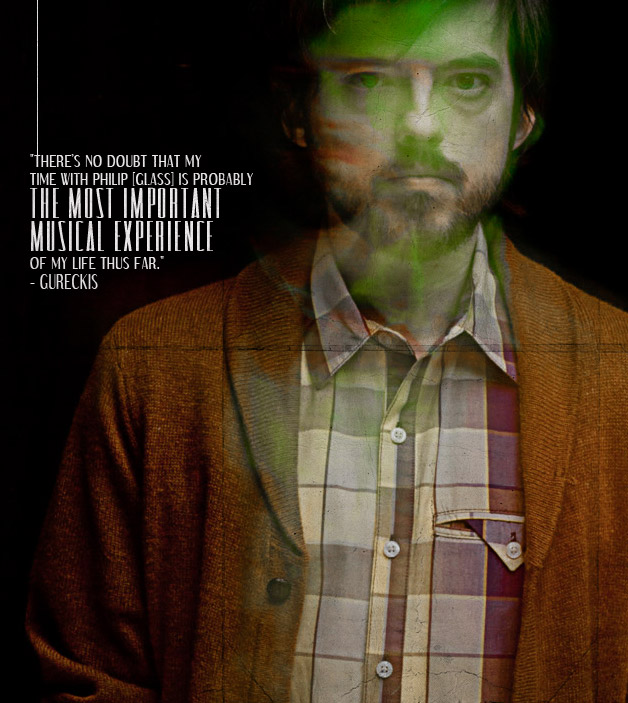
Coming from your educational background in classical, did you feel at all like you had to unlearn or just learn, new musical skills for this project?
T: The most important skill I learned in my academic studies is the ability to deconstruct music. With My Great Ghost, I’m always trying to deconstruct the production of the music I love: So, they probably used this synth, with this effect, with this compression, and this arpeggiator…The line went like this and the beat uses this syncopation. It’s a starting place for figuring things out. You have to at least know how to play the game if you want to be a part of it.
Makes sense. The EP goes through a spectrum of sound. “Photograph,” “Plain sight” and “Helicopter” seem to be in their own group, while “Means to an End” and “Shades Above” have a different sound. Was this meant to give the listener a sampling of the band’s full reach?
T: I’d group “Photograph” with “Means to an End” and “Helicopter” with “Shade Above”. “Plain Sight” is darker than the rest. Honestly, a band this young with just 1 EP and around 7 completed songs, I’m not sure we have enough experience to even claim we can do much more than this. I’m sure by the time we finish a full-length we’ll be able to talk about development and reach.
So it wasn’t intentional then?
D: Not at all really. We probably wrote maybe 7 tracks for the EP, four of which made it on and then you add the Deerhunter cover as the fifth. The decision was simply just which were the best tracks, and that happened to make the choice easy, thankfully. If we had made a different choice you would still see the range in there, it just wouldn’t be as strong of an EP.
I think you made the right choices, the songs all really make sense together.
D: I think along with the diversity that’s present there’s also a clear identity. Surprising, because we come from different places. Though now it seems we’re on the same stump.
Out of all your songs, which best represents the sound you would like to move forward with on an album?
T: We have a new single that we’re finishing that’s in the pop direction of “Means to an End.” Actually, way more pop. There’s also a mean spirited song in the works. It’s dark and moody like “Plain Sight” though. We’ll take it as it comes.








